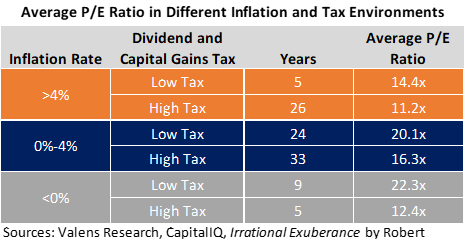As the results are being finalized, let’s look at how the election can affect your portfolio

The election has dominated the news over the past week. Investors may still be wondering what the outcome means for the stock market and economy.
Today, we will revisit last Monday’s Investor Essentials Daily to see what has changed and what has stayed the same.
Investor Essentials Daily:
The Monday Macro Report
Powered by Valens Research
Last Monday, we published an article about how the election could impact taxes and stock market valuations. At the time, polling data and statistical analysis were pointing to an easy Democratic win in the House of Representatives, a Joe Biden win, and a likely Democratic Senate. In essence, a “blue wave”.
Because of that, we highlighted how Biden’s proposed tax plan could affect financial markets. These include raising corporate taxes from 21% to 28% and taxing all capital gains as income for those earning more than $1 million annually.
Well, as we write this article, the blue wave we highlighted as a possible outcome appears unlikely. Joe Biden will most likely be president and the House of Representatives will maintain its Democratic majority. However, the Senate will hinge on Georgia alone with two runoff votes in January.
Most likely, the Senate will be 50 Republicans and 48 Democrats, with both of Georgia’s seats undecided for now. There will be a runoff of the top two candidates in each race on January 5. Democrats will need to win both to tie the Senate, giving the Vice President tiebreak power. This may be difficult for the party – Georgia has not elected a Democratic senator since 2000.
This means it is time to reassess the implications of the election. Luckily for investors, the current implications are good for the markets.
First, we want to touch on Biden’s proposed plan of taxing capital gains as income for those making more than $1 million a year. To be clear, we are not making a judgement on if higher taxes are objectively positive or negative. That is not our job. Instead, we look to understand what higher taxes mean for investors.
One way to think about it is by looking at the Laffer Curve. The Laffer curve is in the shape of a bell curve and has tax revenue on the y-axis and the tax rate on the x-axis. It shows the relationship between the tax rate and how much tax revenue governments collect.
It highlights at a certain point, people will work less hard to make more money if the tax rate is too high. This is because less money ends up in their pockets.
If I keep $0.80 on the dollar, I am more willing to work harder to earn more money than if I only keep $0.60 or $0.40. Or as the chart below highlights in the case of dividend income in the 1950s or 1960s, only $0.10 on the dollar.
It’s a little different when it comes to investment income. Unlike a job, investing is passive. There is little active “work”, other than trading and research.
When someone invests, they sometimes have a net return target, after taxes and inflation. Investors need to hit their target returns to fund retirement, charitable gifts, or another future investment.
When taxes increase, the amount of after-tax income an investor receives declines. To make up the difference and hit their targets, investors need a higher pre-tax return.
The best way to do that is by buying companies at cheaper valuations. By finding stocks trading at lower multiples, investors may be able to garner higher returns.
This is also why we highlighted last week how lower taxes lead to higher realized equity market multiples. A blue wave had the ability to increase tax rates, in turn causing multiples to fall.
Now, this is not as likely. That’s where our observation about how the election results are good for the market comes from.
There’s an old adage on Wall Street that a split Washington is a good Washington.
It now looks like a Republican Senate, Democratic House, and Biden presidency is the most likely outcome once all the dust clears. While there is litigation underway and those Georgia run-offs that could change this, the most likely outcome is the above.
This means what we talked about last week, in terms of potential tax changes, is unlikely to occur. It also means the potential risk of a one-time tax driven dip in the market is low.
We can say with confidence some of the concerns we had are no longer on the table. Because of this, we recommend investors continue to buy and hold equities.
Best regards,
Joel Litman & Rob Spivey
Chief Investment Strategist &
Director of Research
at Valens Research






